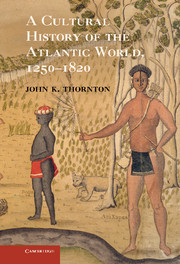Part II - Three Atlantic Worlds
Published online by Cambridge University Press: 05 November 2012
Summary
Three Atlantic Worlds
The accidental voyages of European knights and merchants brought three worlds into contact with each other. In many cases the encounter was startling, even a shock. Columbus was as surprised as the Tainos were when his ships arrived in the Caribbean in 1492. If West Africans and Europeans had some knowledge of each other before the first Portuguese ships inched down Africa’s Atlantic coast, thanks to the Saharan trade, the surprise for Portuguese and Kongolese was probably mutual when they met at the mouth of the Congo River in 1483. Yet none of the participants took very long to realize that the people they met shared their common humanity, and did not resemble any of the monsters that European fantasy writers – precursors to the modern creators of science fiction – imagined might be in the remote corners of the world. If European exploration revealed nothing else, it was that there were no one-legged men with a single eye in the middle of their foreheads as described in the celebrated fantasy-adventures of John of Mandeville.
Europeans, Americans, and Africans discovered a common humanity in their physical forms and in their lives, for in many ways the world of the Age of Exploration and its aftermath had more commonalities than today’s world does. Their preindustrial world was united by common rhythms of life and death, bound by the limits of a constricted food supply, beset by diseases that could not be cured. In this world of the sixteenth or eighteenth century, for example, no society had a life expectancy more than about forty years, and many had less. One out of three or four babies did not survive their first year of life, and on the whole, only half of those who were born managed to live long enough to reproduce themselves. This immense human wastage, sometimes made even worse in the harshest labor and social regimes, such as slavery, rack-renting, or heavy taxation, meant that even birthrates far in excess of those today produced relatively little population growth.
- Type
- Chapter
- Information
- A Cultural History of the Atlantic World, 1250–1820 , pp. 29 - 33Publisher: Cambridge University PressPrint publication year: 2012



